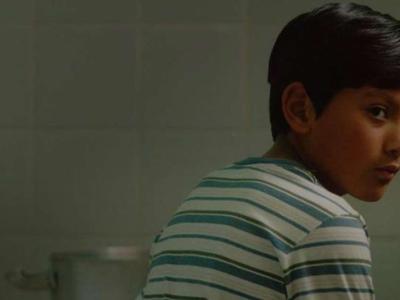‘1976’ is Manuela Martelli’s debut film as a director. With a long and successful career as an actress behind her, she has now turned her hand to directing with equal success. She admits that she cannot remember a time when she did not love film. As an adolescent she would frequent the many cinema house in Santiago de Chile with her friends and dream of being involved in that world. The chance to do so came unexpectedly, as having barely finished school she was cast to play the protagonist in ‘B-Happy’ (2003). This was rapidly followed by ‘Machuca’ (2004) directed by Andrés Wood.
Martelli’s acting career had been decisively launched and she was to act in over 30 films.

Manuela Martelli in B-Happy (2003)
“Today many of those small cinemas we used to go to no longer exist. Those that survived had to resist a great deal and they are the heroes of their time…I already wanted to work in film, but at that time but there were no Film Schools at any of the Universities. There was only one technical school. I wanted to have a university training, I wanted to learn theory as well… after being in those films, I knew for sure I wanted to work in film. I was cast as the lead character, but when I started out, I knew nothing. What followed was so unexpected! At that time, they scarcely made 10 films a year in Chile… yet one film led to another and from there on, I’ve never stopped working in films as an actress.”
Yet Martelli still yearned to go to the university, so she went to study acting and Dramatic Arts, even though at the back of her mind she knew she wanted to make the films herself. Upon completing her studies in Santiago, she won a scholarship to study film making at the Temple University in Philadelphia, USA.
That is where ‘1976’ (2022) began to take shape: -
“The truth is that this project began around 8 years ago. I always kept it at a distance because of the risks that something might happen. I found that reflecting on the possible consequences, it was easier to look back as a way of better understanding the present. What do we have now, in the present, that comes from before? … Film has the capacity of speaking about the past but in the present. There is the possibility of invoking the magic of the past and bringing it to the fore. The reason for this is that you are working with certain materials, that cup of tea from the 1970s, that table from the 60s.Everything is impregnated with history, even the people. There is something of that period of the 1970s that still exists, alive and that is what I put into the film. It’s in the blood!”

Manuela Martelli as Bianca in Il Futuro (2013)
The military Dictatorship of General Augusto Pinochet in Chile lasted for 17 years, from the 11thSeptember in 1973 right up until the 11th March 1990. The first few years were the bloodiest and Martelli decided to set her film in that period. It was not an arbitrary choice: -
“1976 was the year in which my grandmother died. I was born in the 1980s during the dictatorship, Later, I decided to start investigating the life of my grandmother. So, I arrived at the dictatorship period from another angle, more personal, autobiographic and intimate. Nothing to do with History with a capital letter, or what you might have read in the papers. No! I came to it from the kitchen, from the pans boiling on the stove and the crockery… all those objects of my grandmother’s that she had left behind. They were still there in the house and they have me a lot of joy because some had been made when she studied Applied Arts and they were ever present. They expressed how history is omnipresent and how different times can coexist. That inspired me to learn a more about her and to understand her legacy, from the point of view of the anonymous heroines that never had a voice.”
Martelli is particularly aware of the patriarchal society that is still in evidence in Chile. She points out that, at school, not one single history book had been written by a woman and there were no mentions of the points of view of those many anonymous women.
“When my grandmother died, she was very depressed so I began to question why this was the case. The family’s explanation was that it was a personal issue, isolated from the context of the regime. I felt that an historical situation that was so crude and full of horror, must [have found a way] to seep through the cracks of a home and couldn’t believe that her depression was not a part of something much bigger. That depression was not an individual phenomenon but had to do with the social pressures [and expectations] that women were living through at that time, much like that of women in 1950s USA.”
In effect, 1950s America was flooded with advertisements of delicately dressed women apparently blissfully happy in their roles as homemakers, mothers and wives. Perhaps not so blissful after all in that it was also at that time when Heinz Lehmann, the North American psychiatrist saw fit to develop the first neuroleptics and anti-psychotic medications ( Cholporomazine) for depressive conditions. So very likely, as Martelli sussed, “…these isolated depressions make sense when seen in a social context.”
Women had been living under these pressures and suddenly these women who had been isolated become a part of social phenomena. Today that can be seen in Chile with the uprisings largely led by women since Oct 2019, as well as more recently in Iran or even in Europe and the USA, with the #ME TOO movement.
“[The character of] Carmen is inspired by my grandmother, and all the questions I was asking myself about her, the sensation of those controlled lives and so much they were unable to live left them with no outlets for their depressions. I found it interesting to create a character with all the ambiguities of being a bourgeoise with all the attending comforts: a family, a life that was relatively happy, but with all her ambitions frustrated. She carries out her duties relevant to the norms that should make her happy, but still she is not. When democracy is threatened, in the end we are all victims.
How would an anonymous woman feel? We talk about the ‘direct’ victims of the dictatorship, clear, obvious victims, for whom, sadly, Chile has yet to offer justice. However, I believe that there were also other victims that we need to talk about, to be able to understand who we are in the end.
Class division in Chile remains harsh. It is still a patriarchal society, more conservative that other South American countries. The theme of class is very strong. It is put in evidence by your surname, the colour of your skin, the way you speak, the area you live in. Chile is not yet a meritocracy. Improving your financial position is not enough to rise above it, for you are linked by blood, to the family roots, where you come from, that harps back to colonization. The rejection of the indigenous communities continues to be harsh.”

Aline Kuppenheim as Carmen in '1976' ( 2022)
In 1976, all these elements are present. Carmen reads to the blind in the Church hall and visits indigenous communities to donate clothing. Her contact with the church and the local priest is extremely strong, yet she is still representing the ‘conquerors’. There is a whiff of condescension. Initially though, she appears to be blind to what is going on around her, a form of denial, until, that is, she suddenly finds herself involved. Despite the ‘enemy’ being invisible, Carmen starts to pick up on the terror that floats in the air all around and becomes scared that she is being followed.
Manuela Martelli sensitively uses sound and the experimental music of Brazilian composer, María Portugal, to emphasize these elements. Subtle and ever-present, they add to the sensation of claustrophobia and fear: -
“The sounds and the music in the film are important because, in the end, I was asking myself how to portray that horror from the point of view of Carmen. That was my initial premise. I wanted to observe the period from her angle. For her the horror was invisible. Even when she begins to feel it, it is still invisible. She starts to perceive it, she knows it is there, but she cannot see it. In that sense sounds [and music], being off-screen were fundamental to the film penetrating as an invisible presence. It was one of those things that seeps in through the cracks in the house… I also feel that music can incorporate more contemporary elements to the story, bringing it closer to the present… By creating a counterpoint with the period and that threatening atmosphere, yet still remaining invisible. I knew María Portugal’s work, as we had collaborated on a theatrical production in São Paulo. She comes from a background in Brazilian music but also experimental music, so I felt she was right for this production.”
All the atmosphere conveys the internal conflicts. The superb Aline Kuppenheim plays Carmen. She is an actor with the ability to express a myriad of emotions with minimal effort and holds the screen with a powerful presence that expresses her state of mind at all times as she struggles to adapt to the changes. This is a slow-burn film with a meditative quality of quiet observation.
The characters are carefully drawn and the cinematography also follows this pattern with long takes that speak for themselves. Martelli wanted to avoid the use of quick ‘nervy’ cuts, wanting to create a feeling of a continuous flow, allowing time itself to be a presence.
What now?
Manuela Martelli admits she is working on a new idea for which she has not produced a first draft but is reluctant to reveal much at present. Judging by ‘1976’ it will be something to look forward to.

‘1976’ is out now. Find your nearest screening here















